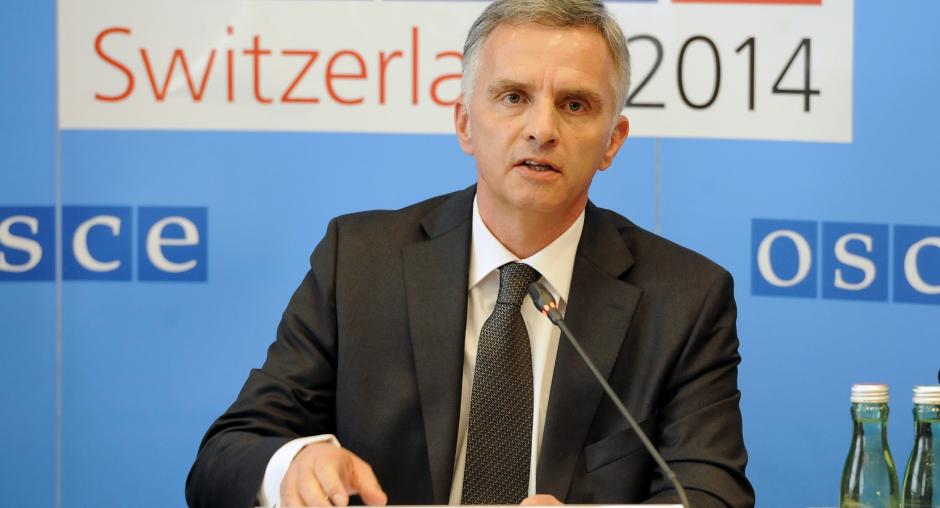Newsroom
Swiss Chairperson-in-Office receives positive responses to OSCE Roadmap, says implementation is well underway
BERN 12 May 2014

Didier Burkhalter, OSCE Chairperson-in-Office for 2014 and Head of the Swiss Federal Department of Foreign Affairs, at a press conference following the Permanent Council in Vienna, 16 January 2014. (OSCE/Micky Kroell) Photo details
BERN 12 May 2014 - The OSCE Roadmap, drafted in a sense of urgency last week as the situation in Ukraine had deteriorated further, and distributed simultaneously to the four parties of the Geneva Joint Statement of April 17, is an offer to help implementing de-escalation measures in a concrete, structured and effective manner, Burkhalter said.
The Roadmap shows a pragmatic way forward to moving from the logic of escalation to the logic of cooperation and enhancing stability on the ground. It is centered around the four building blocks of restraint from violence, disarmament, national dialogue, and elections and seeks to support the Ukrainian government in providing a conducive environment for holding fair and free elections throughout the country on May 25.
During the past days, the CiO outlined the Roadmap in consultations on the highest levels with the four Geneva parties. He received positive responses by Ukraine, the Russian Federation, the US and the EU, Burkhalter confirmed today. He pointed out the convergence of views on the importance of a National Dialogue in Ukraine.
Over the weekend, the Ukrainian government and the Swiss Chairmanship set to work closely together to define the specifics of the National Dialogue and to launch what could become a series of high-level Round Tables. Burkhalter, while stressing the importance of Ukrainian ownership, was pleased to learn that the Ukrainian authorities had accepted the proposal of the Chairmanship to nominate German Ambassador Wolfgang Ischinger as representative of the OSCE and co-moderator of the Round Tables together with an Ukrainian co-moderator to be appointed by Kyiv.
In his exchange with the Foreign Ministers of the 28 EU Member States in today’s Foreign Affairs Council of the European Union, Burkhalter was assured of the full support of the EU for the measures outlined in the Roadmap. In a phone call by Russian President Vladmir Putin later today, Burkhalter was told that Russia was supportive of the Roadmap and of the OSCE’s engagement in Ukraine. Referring to yesterday’s unconstitutional referendum in some locations in Ukraine, Burkhalter emphasized the need for both national and international dialogue regarding Ukraine. He asked the President of the Russian Federation to reinforce earlier signs of Russia’s support for de-escalation and actively contribute to get tangible results in order to strengthen the logic of cooperation.
Encouraged by the positive feedbacks, the OSCE has already begun implementation of the Roadmap, Burkhalter said. Ways of OSCE support for the Round Tables and the National Dialogue are being elaborated with the Ukrainian authorities. The Monitoring Mission continues to scale up and strengthen its capacities for facilitation, mediation, and disarmament support. Rapid Response Teams of the Monitoring Mission are being set up, as is a hotline for alerting the Monitoring Mission. A trust fund for a disarmament program is also being established. Burkhalter repeated that all ownership will be with the Ukrainians, with the OSCE ready to assist in making best use of this window of opportunity.
The Roadmap shows a pragmatic way forward to moving from the logic of escalation to the logic of cooperation and enhancing stability on the ground. It is centered around the four building blocks of restraint from violence, disarmament, national dialogue, and elections and seeks to support the Ukrainian government in providing a conducive environment for holding fair and free elections throughout the country on May 25.
During the past days, the CiO outlined the Roadmap in consultations on the highest levels with the four Geneva parties. He received positive responses by Ukraine, the Russian Federation, the US and the EU, Burkhalter confirmed today. He pointed out the convergence of views on the importance of a National Dialogue in Ukraine.
Over the weekend, the Ukrainian government and the Swiss Chairmanship set to work closely together to define the specifics of the National Dialogue and to launch what could become a series of high-level Round Tables. Burkhalter, while stressing the importance of Ukrainian ownership, was pleased to learn that the Ukrainian authorities had accepted the proposal of the Chairmanship to nominate German Ambassador Wolfgang Ischinger as representative of the OSCE and co-moderator of the Round Tables together with an Ukrainian co-moderator to be appointed by Kyiv.
In his exchange with the Foreign Ministers of the 28 EU Member States in today’s Foreign Affairs Council of the European Union, Burkhalter was assured of the full support of the EU for the measures outlined in the Roadmap. In a phone call by Russian President Vladmir Putin later today, Burkhalter was told that Russia was supportive of the Roadmap and of the OSCE’s engagement in Ukraine. Referring to yesterday’s unconstitutional referendum in some locations in Ukraine, Burkhalter emphasized the need for both national and international dialogue regarding Ukraine. He asked the President of the Russian Federation to reinforce earlier signs of Russia’s support for de-escalation and actively contribute to get tangible results in order to strengthen the logic of cooperation.
Encouraged by the positive feedbacks, the OSCE has already begun implementation of the Roadmap, Burkhalter said. Ways of OSCE support for the Round Tables and the National Dialogue are being elaborated with the Ukrainian authorities. The Monitoring Mission continues to scale up and strengthen its capacities for facilitation, mediation, and disarmament support. Rapid Response Teams of the Monitoring Mission are being set up, as is a hotline for alerting the Monitoring Mission. A trust fund for a disarmament program is also being established. Burkhalter repeated that all ownership will be with the Ukrainians, with the OSCE ready to assist in making best use of this window of opportunity.
